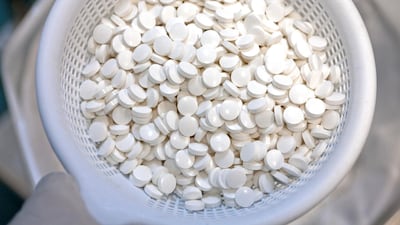Gulf Pharmaceutical Industries (Julphar), one of the biggest drug manufacturers in the Middle East and Africa, narrowed losses for the first quarter by 30 per cent after lowering its costs.
Net loss attributable to equity holders of the parent for the three months ending March 31 fell to Dh62.5 million from Dh89.1m for the prior year, the company said in a statement to Abu Dhabi Securities Exchange, where its shares trade.
The company's cost of sales for the period was down 15 per cent year-on-year to Dh90.6m and selling and distribution expenses were cut by 24 per cent to Dh49m, while revenue fell by 6 per cent to Dh104.4m.
General and administrative expenses rose to Dh27.4m, from Dh20.5m in the prior period.
The company attributed accumulated losses of Dh565.7m, or 49 per cent of its capital, to the temporary suspension of licences to export medicines to Saudi Arabia, Oman, Bahrain and Kuwait, as well as product recalls because of quality issues.
Julphar is taking measures to address these and to increase revenue.
“Temporary suspension to Saudi Arabia, Oman and Bahrain has been lifted. Lifting of temporary suspension to Kuwait is expected in [the] near future,” it said.
The company gained approval to resume exporting its products to Saudi Arabia last month. The ban was lifted following a “successful inspection of its manufacturing facilities”.
Saudi Arabia banned the sale of Julphar's products in 2018 for failing to meet regional standards.
Set up in 1980, Julphar distributes pharmaceutical products to more than 50 countries on five continents. It has 16 manufacturing facilities in Africa, the Middle East and Asia.
The company is also planning to launch products in 2020 to increase market share and improve profitability.
Other measures to reduce losses include bringing in external consultants to improve the company's key processes. It is also embarking on a capital restructuring to offset accumulated losses by reducing the amount of shares in issue, which will be followed by a rights issue to strengthen its balance sheet.
The capital restructuring involves first reducing the company's share capital by just over Dh503m by cancelling shares to extinguish losses, and then raising up to Dh500m through the issuance of new shares with a nominal value of Dh1.
The company appointed Essam Farouk as its chief executive last month to oversee its strategic direction.


